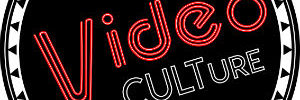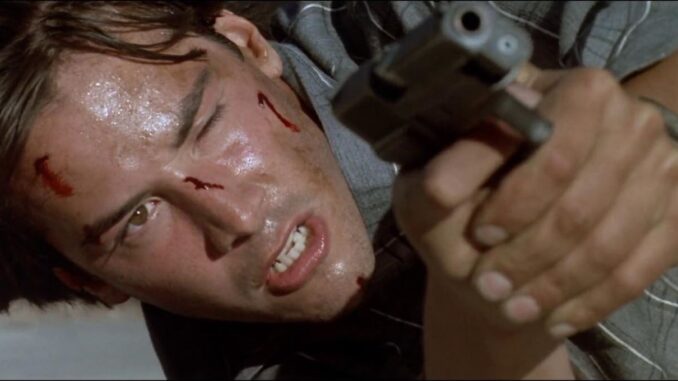
“Staff Picks” is a deeper look into movies that we love here at Video CULTure. Each edition of this column will focus on a single film that we think you should check out, either for the first time or for a long-overdue revisit.
___________________
By Patrick Bartlett (Twitter: @alleywaykrew)
When Kathryn Bigelow finally became a well-respected director in the 2000s for making movies like “The Hurt Locker” and “Zero Dark Thirty”, I was happy that she was finally getting recognition. However, I was still somewhat bemused that it took so long. I already wrote about my beloved “Near Dark” before this (and I think “Strange Days” is unfairly forgotten) but to this day, my favorite film she’s ever made and almost certainly my favorite film she ever will make is “Point Break”.
You may scoff when I talk about my love for Point Break. That’s fine. I will always argue that it’s deserving of a second look before passing judgment though. At the very least, you have to admit that it’s well directed on a technical level. Let’s start there. The way that Bigelow tells the story visually has been influential if not completely plagiarized by countless other movies that followed in the ’90s but also some really well respected films in the decades since. I’m sorry but you can’t tell me that the bank robbery scenes here weren’t an influence on scenes in Michael Mann’s “Heat”, and in turn, Christopher Nolan’s “The Dark Knight” or Ben Affleck’s “The Town”. You can say what you want about Keanu Reeves’ performance…and it may very well be valid…but you can’t say that other movies featuring him as an action star like “The Matrix” or “John Wick” would exist if “Point Break” didn’t open up people’s eyes to the possibilities of him as a star in that genre. Christ, on a structural level, definitely the first but arguably the entire “Fast & Furious” franchise is based on its script, a script that’s credited solely to W. Peter Iliff. The uncredited writers that brought “Point Break” into its final shooting form though were Bigelow herself and, her husband at the time, James freaking Cameron. As far as I’m concerned, the influence of “Point Break” cannot be overstated.
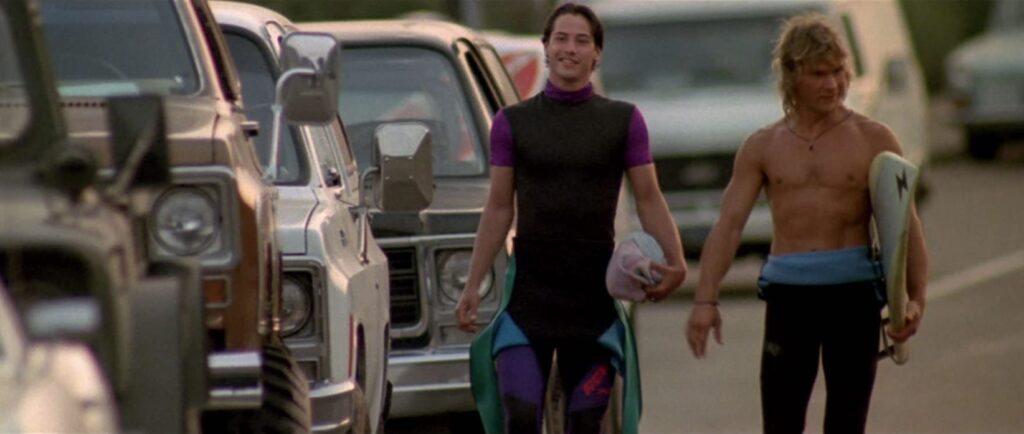
Case in point, the plot of “Point Break” is that newly minted special agent Johnny Utah (played by Reeves) is beginning his law enforcement career working bank robbery cases in Los Angeles. He’s partnered with Gary Busey’s character, the seasoned agent Pappas, who is more or less a laughingstock for presenting the idea that a group of seemingly untouchable bank robbers in the area are in fact a group of surfers. Utah goes undercover to try to infiltrate the surfer subculture and try to catch the thieves, only to end up as an integral member of the very group he’s after. Bodhi, the leader of said group (Patrick Swayze in one of his greatest performances) sees qualities in Johnny that intrigue him and lead to a relationship that’s never entirely clear even at the end of the film. Upon many viewings, the interpretation I’ve come to is that while the rest of the group is very tight knit, the pecking order is very clear. They all serve a purpose and they all follow Bodhi. They’re a pack of wolves and he’s the alpha. Johnny Utah is another alpha, an equal to Bodhi. This is never more clearly shown than at the beginning and end of one particular sequence. When Johnny and Pappas finally zero in on Bodhi’s guys and their next score, they try to catch the crew at the robbery. Both Bodhi and Utah have the opportunity to put the other down at different points. Neither man will actually take that opportunity. There is a somewhat adversarial nature to their relationship but there’s also a clear mutual respect and a deep unspoken bond between the two.
The sequence I’m speaking of is what many people…including director Edgar Wright, another avid fan of the film, point to as one of the greatest chase scenes in film history. It’s essentially the centerpiece of the film. This is a sequence that starts as a gnarly car chase with the supporting characters involved and eventually becomes a foot chase with Utah chasing Bodhi through alleyways and even occupied homes. It finally ends with Johnny enduring a moment of truth where he has Bodhi in his sights but refuses to take the shot. That’s not even the craziest action sequence in the film either. The climax involves Patrick Swayze actually jumping out of a plane on camera and ending up in what’s essentially a midair fight sequence between his character and Reeves’. All of this happens among the aforementioned influential bank robbery sequences peppered throughout the film.
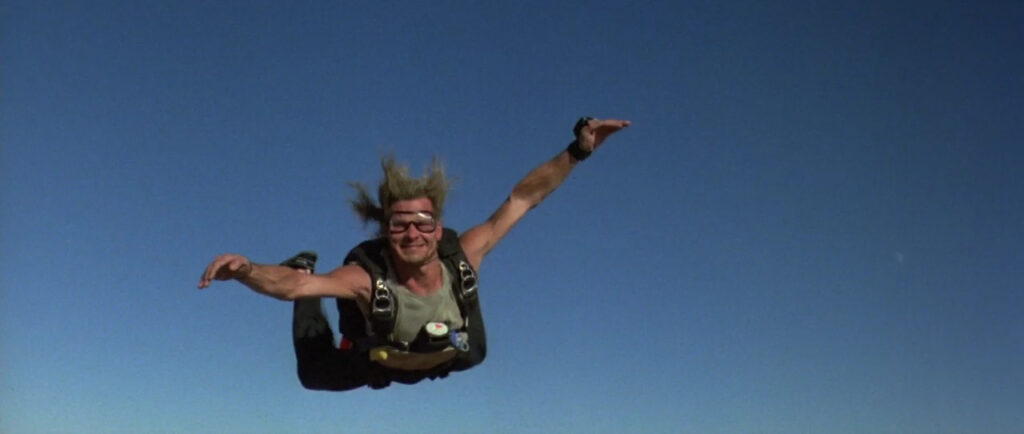
All of that is great and I love it but it’s not why I love the film overall. It’s not why I keep returning to it. I probably watch “Point Break” annually. I can still enjoy the action time after time but the main thing that keeps me coming back is probably the same thing that keeps me coming back to all of my favorite films. The characters and their relationships. I know that’s not necessarily the first thing people think of when they talk about why they love action films but I feel like you have to understand it on at least a subconscious level. Seriously, why keep coming back to the “Lethal Weapon” franchise or even something like the “Fast & Furious” films if not to the see characters you love again and again? Whether that be in sequel after sequel or rewatch after rewatch, it’s the reason that it’s unfair to write off franchise cinema. There is definitely something to be said for creating characters and relationships that only exist for one film though. The supporting characters here, whether they be the bank robbers or Busey’s character or the love interest that both Reeves and Swayze’s character share on a certain level (played wonderfully by Lori Petty)…they’re all likeable and they all feel important to the story. They never really feel like fodder and it would be so easy for them to. You can’t help but feel for them, even before things spiral out of control. That’s Kathryn Bigelow’s gift. You can look at her filmography and see pretty much across the board, she never has supporting characters that feel like caricatures. You may not know much about them but you can’t help but like the lot of them.
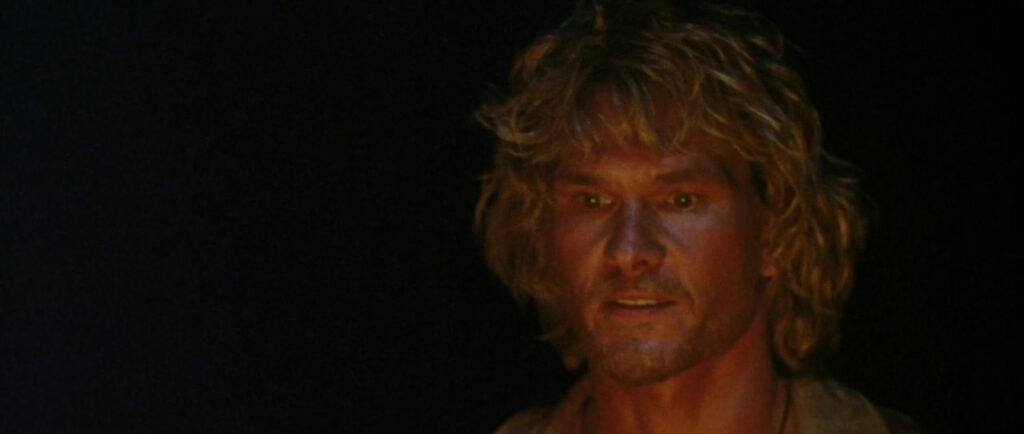
Kathryn Bigelow is undoubtedly the film’s greatest asset. Her eye, her directorial prowess, everything she brings is what elevates this beyond standard action fare. However, it could just as easily not work as brilliantly as it does if not for Patrick Swayze and Keanu Reeves. While I’d happily see alternate universe versions of the film with all the actors that were considered, whether that be Matthew Broderick or Johnny Depp…Swayze and Reeves bring charisma and substantially more pathos than you might expect of a film like this. Sure, one could argue charisma is all Keanu brings to the proceedings but I can’t help but point out that while it definitely seems like he’s trying too hard at points, that’s true to this character. It’s integral to the character really. Johnny Utah is a 25 year old guy who had to pivot from a career as a star college football player on the verge of going pro into a career in law enforcement after a serious injury. He’s a guy who is trying to fake it until he makes it. All of that is complicated by him going undercover and having to question who he really is. Sure, you may be questioning Keanu’s believability but his character is too. On the other side, you have Patrick Swayze as the very definition of a charismatic leader. He’s someone that could be JFK or he could be Adolf Hitler. There’s elements of heroism as well as elements of villainy both inherent. Bodhi is a guy that you can never pin down. One moment he can seem like a sociopath. In the next scene, either explicitly or just behind the eyes, there’s a clear deep well of emotion. He’s also a man trying to figure out who he is from moment to moment, despite presenting a confident face to the world. With any other actor, I’m not sure that the ever shifting balance inherent in the character could be pulled off as beautifully as it is by Swayze. I don’t think he ever truly has been given credit for how good of an actor he was. He’s a man that I’m proud to share a name with. Anyway, both characters are sides of a coin and both lead actors carry their share of the workload in a way that I wish was given more appreciation.
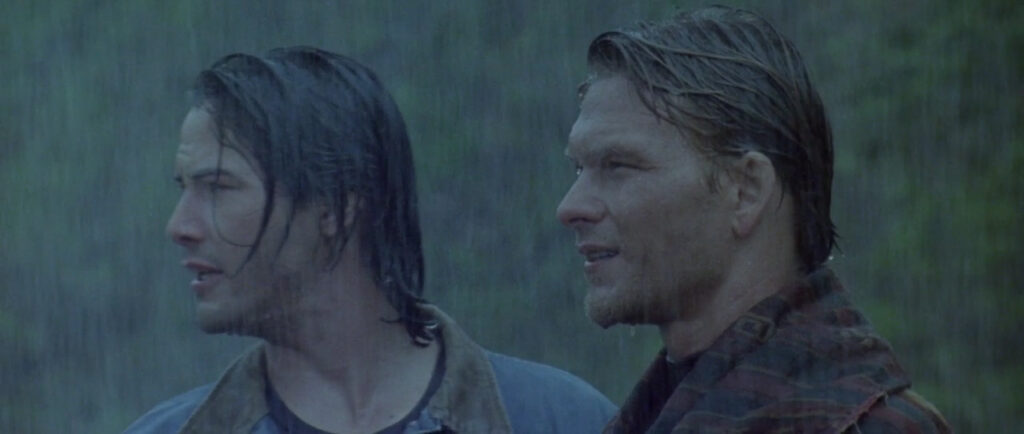
In the pantheon of action cinema of the ’90s and movies in general, “Point Break” is a landmark. There are reasons that it’s still closely held by some, such as myself. For a film of that genre in that era, the fact that everyone involved treated it seriously is a large part of why it endures. Some may not be willing to admit it but “Point Break” truly is a special film. Others have tried to replicate it but none are ever likely to simply because it could only ever be this. They even tried to remake it and the final product didn’t even come close. “Point Break” had to have these people work on this script, cast these actors, hire this director to bring it all together, etc. It’s an alchemy that lead to a work that could very easily be called revolutionary. Its influence permeates even today, almost three decades later. That may be the greatest testament to this film. It lives on and on.
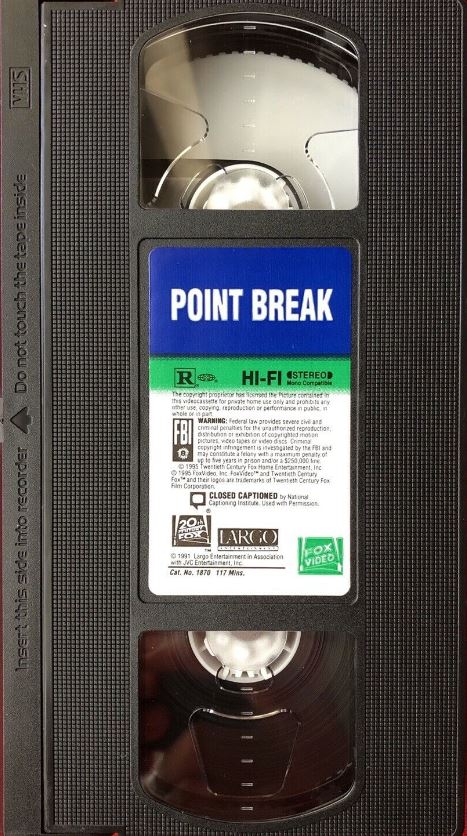
To find out where this film is available to stream, click here: Just Watch
